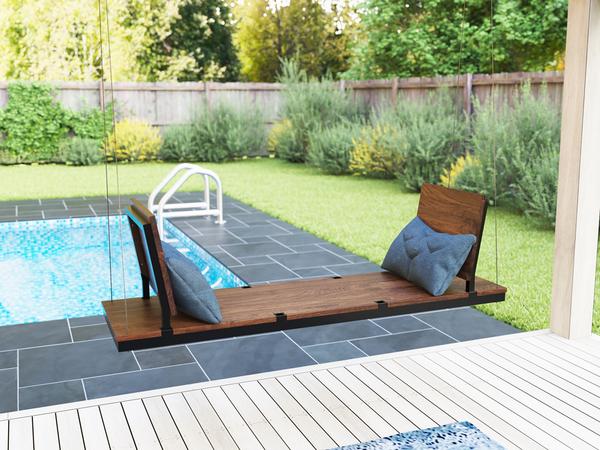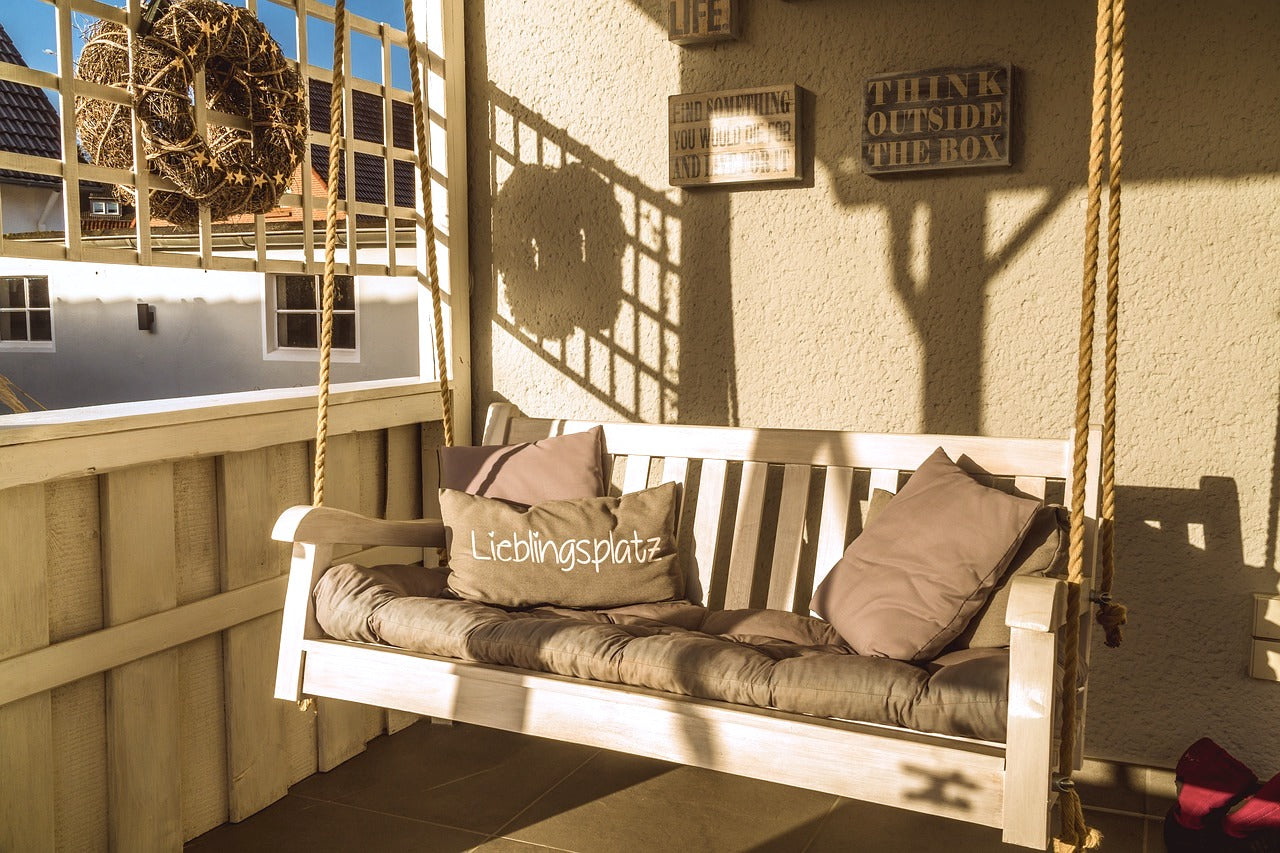
Installing a wooden porch swing is one of the simplest and most-cost effective home improvements. Their charming aesthetic instantly maximizes curb appeal.
But it is more than just for show.
A front porch swing is an inherently fun gathering place to spend afternoons with family and friends. Not to mention one of the best spots in the house to steal away quiet alone time with an enthralling summer page turner — and maybe a glass of wine, too.
The memories made around porch swings last a lifetime and the swing itself should have the same amount of staying power. Like all treasured parts of our home, a wooden porch swing needs a little TLC from time-to-time, but certain materials simply stand up better for the long haul.
There are many types of wooden porch swings on the market. Selecting the right type of material can be overwhelming considering all that is available.
This guide will walk you through the best types of wood for a porch swing.
An Overview of the Best Wood Types for Porch Swings

The biggest consideration when you’re buying a porch swing is its material. Cypress, cedar, pine, and teak are the most common types of wood used for porch swings. Each has different hallmarks that are suitable for different tastes and budgets.
If you want your porch swing to stand the test of time it’s important to choose a model that is crafted from high-quality weather resistant material.
Wooden porch swings crafted from cypress or cedar can last generations. On the flipside, low grade woods like pressure-treated pine, whitewood, and poplar tend to warp pretty quickly and oak wood swings decay with time.
Exotic woods like teak are also a popular durable material for wooden porch swings. The high price tends to make it cost-prohibitive. It is also worth noting that teak is one of the least environmentally-friendly options because it is sourced by clear-cutting tropical forests.
Here is a more detailed look at some of the most popular wooden porch swing materials on the market.
Cypress Porch Swing

Known for its natural beauty and durability to withstand the elements, cypress is among the most sought-after porch swing materials. In fact, the material is so durable its often called the “Eternal Wood” because it ages gracefully.
Cypress produces its own naturally occurring protectant called cypressine, which shields the wood from heat, decay, rot, and insects. This makes it a prime choice for outdoor furnishings and exterior sliding.
The wood is characterized by intricate wood-grain patterns found in only the highest-grade lumber. Left untouched the wood is naturally a soft honey-hue, but the wood takes color from stain exceptionally well.
Found growing in the southern region of United States, cypress is also among the most environmentally-friendly wood selections for a porch swing — there is even evidence that cypress trees regenerate from cut stumps, according to Cypress.org.
Available in a stain-free clear coat finish or a dark walnut stain to bring out the rich marbling of the cypress, the American-made Organic Swing is a modern example of a wooden porch swing crafted from precision-cut, hardwearing cypress hardwood.
The Organic Swing’s cypress wood pieces are set on a lightweight, steel frame and suspended from galvanized, aircraft-grade steel cable for a distinctively modern look and added strength. Frames are powder-coated to provide maximum durability against scratching, wear, and rust.
Cedar Porch Swing

Like cypress, cedar is among the most desirable wood choices for a porch swing. The light-weight wood is naturally beautiful and its oils make it naturally resistant to rot and insect damage.
Cedar is red in color when it is new but fades to a silvery-gray or brown as it ages — though, like cypress, cedar accepts stain well.
The two most common types of cedar used for porch swings are Northern White Cedar and Western Red Cedar. Western Red Cedar swings are considered to be the best cedar option because of its rich red color and its uniform, fine-grained texture, according to Street Directory.
Red Cedar is also eco-friendly and is considered a sustainable resource.
Pine Porch Swing

Pressure-treated pine is the lightest weight and least expensive of all the most common types of woods used to craft porch swings. As such, it tends to warp and wear pretty quickly in comparison, and requires more regular maintenance overall.
Pinewood is naturally a light yellow or whiteish hue but easily accepts paint if you want to add a splash of color. Pine is best maintained when it’s coated with an outdoor semi-gloss latex paint. This type of paint provides ultraviolet protection and expands and contracts with the weather, allowing the pine to have a better chance to stand up to the elements.
It is not recommended to leave a pine porch swing outdoors without sealant since it is not naturally weather or insect-resistant like cypress and cedar.
Teak Porch Swing

Teak is a hardwood known for its beauty and durability. Experts estimate teak furnishings can last more than 100 years outdoors because of its ability to withstand insect damage and extremes of heat and cold.
Its rich color and distinctive grain also made teak a popular wood for porch swings in the past. The exotic wood naturally tends to become a silver-gray tone with age but when coated with teak oil maintains its warm golden tone.
Despite its beauty and durability teak has drawbacks. Not only is it among the most expensive and thus most cost-prohibitive options, exotic woods such as teak are sourced by clear-cutting tropical forests.
Once widely used for outdoor furnishings, the deforestation of teak has led to the product being strictly controlled, according to The Washington Post.
Which Type of Wood is Best for my Porch Swing?

Quality is the most considerable factor in purchasing a wooden porch swing that lasts a lifetime.
While low grade woods like pressure-treated pine tend to break down over time, high-quality wooden porch swings crafted from cypress can last generations.
And as beautiful and durable as exotic teak wood is, its expensive price tag along with the negative consequences to the environment make it far less sustainable than cypress wood porch swings, like the Organic Swing.
Moreover, Organic Swings is committed to leaving the world a better place than before. This means using sustainable, eco-friendly materials.
In partnership with the Eden Reforestation Project, the company plants ten trees for each swing sold. Since working together, the company has replanted forests equal to 20 football fields in some of the most impoverished and deforested countries in the world.
There’s no denying the natural beauty and durability of cypress wood porch swings. With proper maintenance, it’s a porch swing material that will provide your family a lifetime of relaxation.



